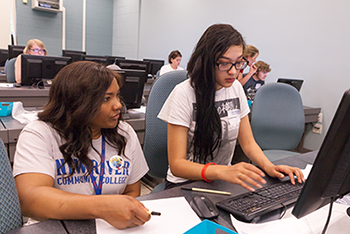Jan 11 2018
This article was published on Jan 11 2018 and was archived on Jan 12 2019. The information below may be outdated or inaccurate.

Here in the Appalachian Mountains, we value independence. It’s our greatest strength and our greatest weakness. It’s a weakness when it means that we are disinclined to ask for help when we clearly need it. It’s a strength when it means that we create our own homegrown solutions to our student success challenges rather than relying on tools and models from outside vendors that may not fit the contours of our college’s culture, strengths and challenges. That’s what we’ve done in Dublin, Virginia, at New River Community College (NRCC), where more students are making it through classes and sticking around for subsequent semesters.
Since fall of 2014, the college has seen a 25% reduction in student withdrawals from courses and a 6.9% increase in fall to spring retention, all while grades have remained steady. We attribute this incremental success to the implementation of what we call our intentional engagement model of student support – a model that has been developed internally at our institution based on our unique culture, strengths, needs and business processes. Several years ago, when community colleges nationally started broadening their focus on expanding access to college to also include expanding success in college, NRCC took a data-driven approach to create a model that fits the unique contours of our institution, as opposed to adopting one of the countless one-size-fits-all approaches currently on the market.
A buzzword in the student success discussions nationally has been “predictive analytics,” but when NRCC staff attempted to identify the data points that most strongly predict if and when a student might be in danger of dropping out, we found it difficult to adapt the concept to our reality in a way that is practical and actionable. Approximately two-thirds of our students are low-income and/or first-generation college students and almost all work while they are in school, many for 40 hours or more a week. Compounding these dynamics is that aforementioned Appalachian culture that values independence. While normally a strength, if valuing independence means that our students won’t ask for help when they need it, it is also a challenge.
What NRCC needed, we decided, was a culture change to a new definition of independence, one that emphasizes joint accountability and asking for help when needed. It isn’t possible to change the culture by focusing on one aspect of our students’ lives (like textbook costs). Nor is it possible to change the culture by focusing just on a subpopulation of our student body. In fact, we decided it wasn’t possible to change the culture by simply focusing on our students. Our culture change initiative needed to incorporate all of our students, faculty and staff, full- and part- time.
So, three years ago, NRCC established the intentional engagement model of student support. The success of this model rests in the ways it was created and implemented by faculty and staff all over campus, but it is empowered by two significant new components – the Accountability in Student Learning Program team of connection specialists and a homegrown technology platform we call CLAS (Connecting Learning Assets and Students).
For the past three years, all NRCC students have been assigned to one of our connection specialists whose responsibility is to connect students in their caseloads with the campus and community resources they need in order to meet their educational goals. Students first meet their connection specialists at a newly required New Student Orientation where they also share their preferred contact information and educational goals. Over the course of their studies at NRCC, most students develop a relationship with their connection specialists.
While students often reach out to their connection specialists for support with anything from transportation needs to academic advising questions (we still have separate faculty and professional academic advisors), most contact occurs when connection specialists, lightheartedly nicknamed the Bloodhound Gang, reach out proactively to students through phone calls, text messages and even showing up at their classes.
This proactive outreach is most often triggered by data entered in CLAS, the college’s homegrown technology platform. Three times each semester, instructors are required to submit progress surveys for each of their courses. On these progress surveys as well as at any time during a semester, instructors raise praises or concerns about students. Concerns include, but are not limited to low assignment or test scores, attendance problems or generally being in danger of failing. Praises include comments like “good classroom participation” and “keep up the good work.” At the instructors’ request, we also added a more moderate “kick it up a notch” to make sure that they weren’t missing the middle-of the-road students who may otherwise get ignored in an early alert system like this.
Praises and concerns generate emails to the students while concerns also automatically generate a referral to the student’s connection specialist. Connection specialists also receive referrals on other occasions, such as when a student is placed on financial aid warning status or has not registered for classes for subsequent semesters or may be eligible for a scholarship. The goal is for connection specialists to reach out to the student about any referral within 24 hours.
All faculty and staff have access to CLAS where they can see and enter student profile information (including photos, educational goals, preferred contact information, schedule, course/grade history, attendance records and all notes associated with previous interventions, including tutoring). Any faculty or staff member can be assigned a referral on any student, but the majority of referrals flow to and from connection specialists, advisors, tutors and other student services staff.
Student support has changed from what we call a purely invitational model - in which we tell students where they can find support for various needs and then wait for them to ask for help – to also include an intentional (or intrusive) model – in which we reach out to students when data, generated by faculty and staff, indicate they need help. Now, for example, instead of an instructor simply recommending that a student sign up for a tutor, an instructor can also send a referral to our tutoring department who will reach out to the student to find out when he or she would like to come in for tutoring. Although, at first, this seems like a lot of hand-holding, the ultimate goal is that students learn to advocate for themselves by the time they leave us to enter the workforce or to transfer to a four-year institution.
Without our tailored intentional engagement model, connection specialists or this homegrown technology platform, we believe our trends would more closely mirror those of our peer institutions in terms of plummeting enrollment and poor retention rates. Instead, our enrollment numbers are remaining steady and our students are sticking around to complete more classes and come back in subsequent semesters. During a time of increasingly limited resources for higher education, our model requires significant investment in terms of both money and staff time, but it is low when compared to other successful community college programs like CUNY’s ASAP program. For that reason, it might be tempting for other institutions to adopt NRCC’s intentional engagement model. But our experience would caution against that.
We believe that the incremental success we’ve seen from our intentional engagement model thus far has largely been based on the ways in which it is built on our strengths (e.g. technological innovation and a culture of hospitality) in order to meet our unique set of needs within the context of our unique culture. Having created the intentional engagement model at our college, it was easy to get faculty and staff to buy-in, which is demonstrated by our nearly 100% completion rates on the progress surveys. While elements of this model may be useful in other settings, our experience indicates that other institutions could be better served by creating their own models starting with their own institutional cultures, strengths and challenges rather than attempting to implement a one-size-fits-all approach with a model developed elsewhere and then retrofitted for their own campuses. The hard work of identifying our unique challenges and developing our own solutions has been critical to our success so far. The model we developed fits our college and our faculty and staff feel more ownership as they witness how their input in its development is creating a positive impact on their students’ success.
Written by Jill Williams
Published on January 11, 2018 in American Association of Community Colleges' Community College Daily
Public Relations Specialist / Adjunct Instructor
